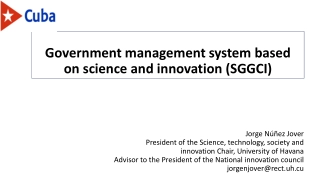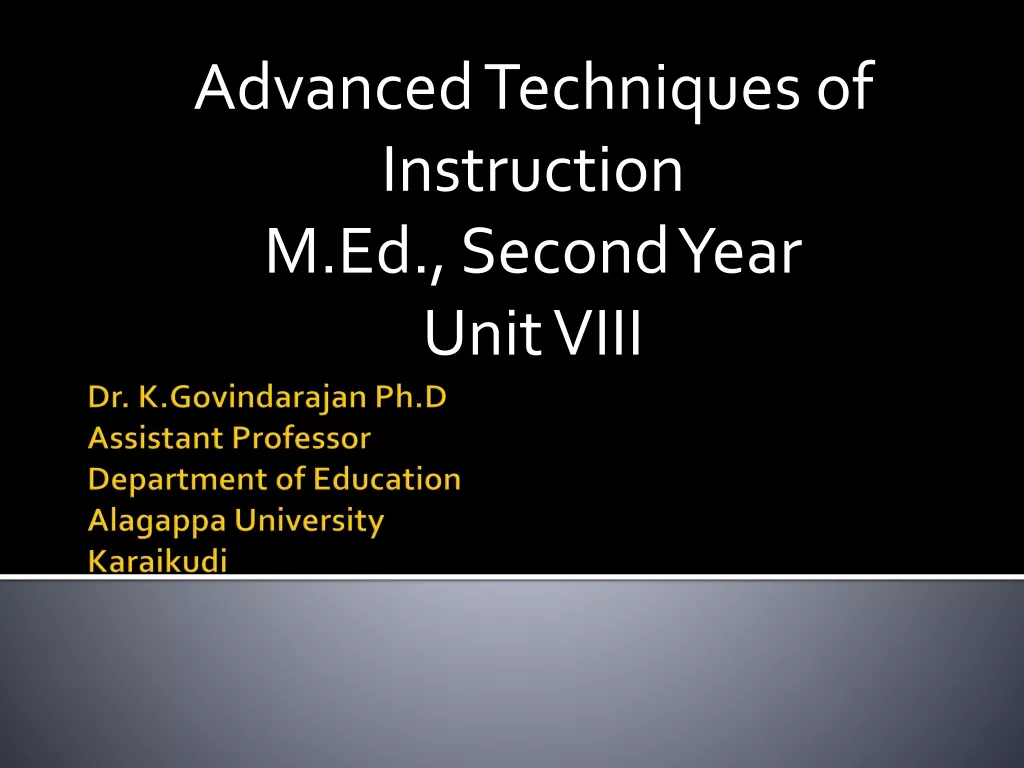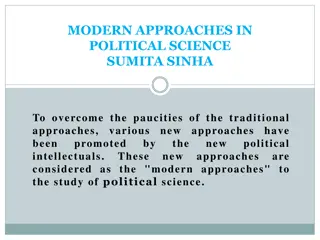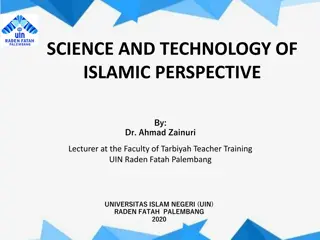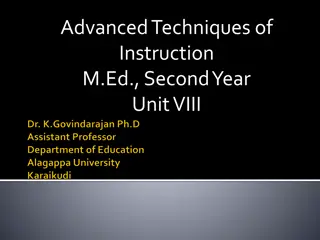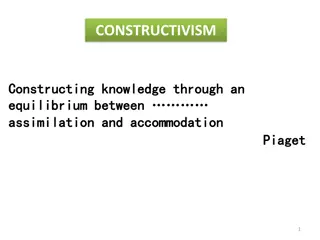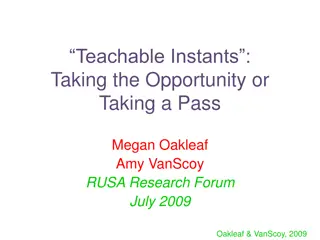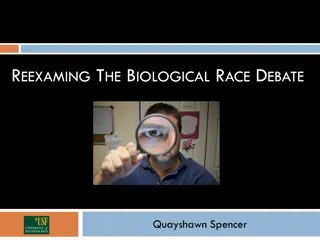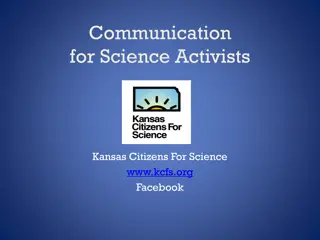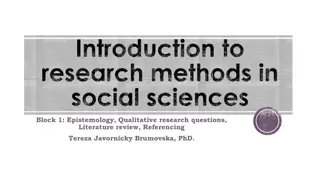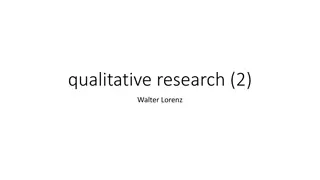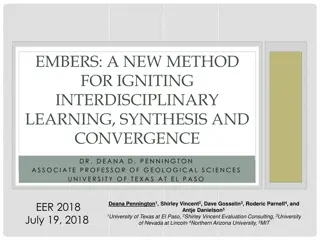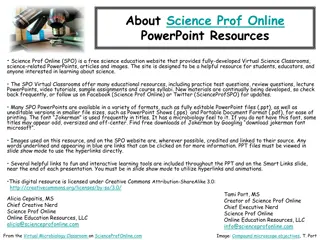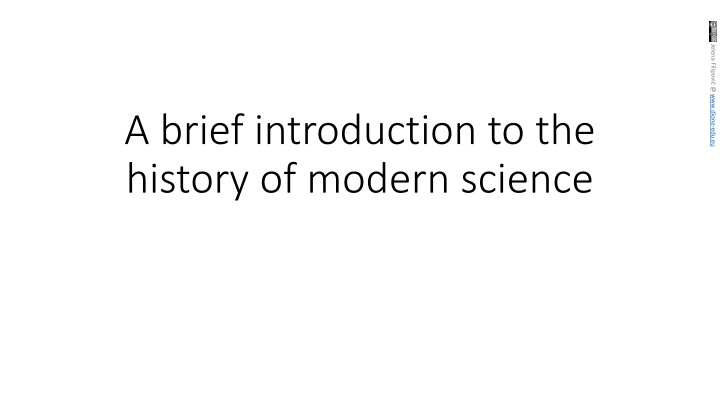
Brief Introduction to Modern Science and Positivism by Jelena Filipovi
Explore the birth of modern science and positivism in the Enlightenment period through the works of Jelena Filipovi. Understand the principles of empiricist and positivist science, focusing on observation, measurements, and quantification for true scientific knowledge. Discover how positivism separates religious dogmatism from knowledge and emphasizes empirical testing for meaningful expressions. Delve into how positivist science applies to social sciences and humanities, enabling rigorous research methodologies for studying human behaviors and societies.
Download Presentation

Please find below an Image/Link to download the presentation.
The content on the website is provided AS IS for your information and personal use only. It may not be sold, licensed, or shared on other websites without obtaining consent from the author. If you encounter any issues during the download, it is possible that the publisher has removed the file from their server.
You are allowed to download the files provided on this website for personal or commercial use, subject to the condition that they are used lawfully. All files are the property of their respective owners.
The content on the website is provided AS IS for your information and personal use only. It may not be sold, licensed, or shared on other websites without obtaining consent from the author.
E N D
Presentation Transcript
Jelena Filipovi @ www.dione-edu.eu A brief introduction to the history of modern science
The birth modern science: modernity and empiricist/positivist science Jelena Filipovi @ www.dione-edu.eu 18th c., Enlightenment (Age of Reason), Modernity, Rationalist view of science The project of modernity formulated in the 18th century by the philosophers of the Enlightenment consisted in their efforts to develop objective science, universal morality and law, and autonomous art according to their inner logic. (Haberemas, 1981: 9; also see Bauman & Briggs, 2003, for a detailed account). Empiricist science is directly related to the capacity to systematically observe and describe selected, sampled natural (and by default social) phenomena in order to design models of reality suitable to account for and/or predict nature and behavior of other phenomena belonging to the same group, species, category, etc.
Jelena Filipovi @ www.dione-edu.eu Modern positivist science based on the separation of religious dogmatism and knowledge What is scientific knowledge according to modern science of the Enlightment period? Knowledge can be reached only through observation, measurements and quantification (experiments, empiricism and objectivity in research) Only scientific knowledge is true knowledge and any type of phenomena that cannot be observed and measured cannot be accounted for in a scientific way Fun short video on positivism: https://www.youtube.com/watch?v=zUh5mAekUfA
Jelena Filipovi @ www.dione-edu.eu Positivism also known as empiricism Empiricism = scientific positivism: Epistemologically, the positivist paradigm assumes a knowable reality, with a single, absolute truth accessible through objective methodology. This framework of inquiry strives to establish causal relationships between variables so that laws can be established and predictions made (Van de Riet, 2004: 547) It follows that meaningful expressions must be empirically testable by observation and experiment. Nontestable statements are literally nonsensical and meaningless (Phelan, 2001: 122
Jelena Filipovi @ www.dione-edu.eu In social sciences and humanities Positivist science affirms that human beings and their behaviors can be researched by using rigorous scientific methodology Measurements and quantification so that theoretical models can be validated Details of experimental procedures always accounted for in order to be replicable to assure validation of models and theories Individuals, communities, cultures, languages, etc. can be researched in the same way we research phenomena in natural sciences (sociology, psychology, anthropology, linguistics, etc.)
Quantification - another crucial element of empiricist/positivist science Jelena Filipovi @ www.dione-edu.eu Quantitative research aims to classify features, count them and construct statistical models in an attempt to explain what is observed. (McCusker & Gunyadin, 2014: 2). In order to produce data of scientific value and rigour , quantitative methods in social sciences and humanities designed in the following way: hypotheses defined at the onset of every research; experiments carried out under controlled conditions (not in real-life situations within authentic socio-cultural contexts), closed surveys and structured interviews which can be statistically processed carried out; observation without personal engagement of the researcher (non-participant observation)
Objectivity and emotional or individual detachment Jelena Filipovi @ www.dione-edu.eu Researchers are neutral in face of the objects/subjects of their research is another feature of empiricist/positivist science. Heisenberg (1958/2000) asserts: classical physics science started from the belief or should one say from the illusion? that we could describe the world or at least parts of the world without any reference to ourselves (p. 22) (Cantley, 2014: 3)
Jelena Filipovi @ www.dione-edu.eu Scientific objectivity??? can we be completely objective when engaging in scientific research? Is there an an objective world completely independent from our experience?
Ideological construction of scientific elites based on positivist science Jelena Filipovi @ www.dione-edu.eu The success of science has given it a privileged, or ideological, status that has the effect of suppressing dissent, molding worldviews, and supporting lites (typically white, Anglo-Saxon, protestant males), regardless of the merits of their position vis- -vis others reality (Phelan, 2001: 129).
Jelena Filipovi @ www.dione-edu.eu Practice of science vs. Ideology of science (Hacking, 1999; Bauman & Briggs (2003), ) Politics of science: institutionalized epistemological orientations and methodological procedures used to identify and analyze phenomena in a wide range of scientific disciplines whose findings stand in direct correlation with narrative and rhetorical means and registers used along the way. acquired bodies of information defined and described in such a way are then disseminated through formal educational systems and institutions of culture, politics, etc. These become canonized scientific frameworks, to the largest extent embodied in the scientific and political institutions of the Western world, designed in alignment with the Eurocentric model of society and science, since the Enlightenment onwards (Filipovi , 2015: 11).
Jelena Filipovi @ www.dione-edu.eu In other words, even though scientific positivism born out of Enlightenment initially represented an attempt to separate the reason from the canonical restrictions in social, religious and political life and thought of the previous eras, very early on it acquired another dogmatic ideological facet of technocratic consciousness , which has been maintained in many areas of science to the present day (Hold, 1980: 296). an underlying assumption being that the search for universal truths and natural laws is unbiased and objective - social work (Bauman & Briggs, 2003: 4) or even social engineering (Filipovi , 2015: 11)
Jelena Filipovi @ www.dione-edu.eu Constructivism A reaction to the assumed objectivity of the positivist science Everyone can read the terms in his own way, and in accordance with the tradition to which he belongs. Thus for an empiricist, progress will mean transition to a theory that provides direct empirical test for most of its basic assumptions. Some people believe the quantum theory to be a theory of this kind. For others, progress may mean unification and harmony, perhaps even at the expense of empirical adequacy. This is how Einstein viewed the general theory of relativity (Feyerabend, 1975: 18).
Jelena Filipovi @ www.dione-edu.eu All knowledge is socially constructed and context dependent Even pure scientific facts are often socially constructed from assumptions, expectations, and conventions rather than directly verified (Phelan, 2001: 128) A very enlightening video on non-existing neutrality of hard sciences and the power of discourse of persuasion in science: Alan Macfarlane King s College anthropologist on Bruno Latour and the subjectivity of science and delusion of modernity https://www.youtube.com/watch?v=cztvJg5YWUE
Jelena Filipovi @ www.dione-edu.eu the social organization of the scientific community has a bearing on the knowledge produced by that community (Longino, 2013), Hence, scientific ideologies, privileged positions and hegemonies, are targeted in constructivist research. In general, constructivism is critical of science (as an especially privileged and elitist way of knowing) (Phelan, 2001: 128). Example: Boaventura de Sousa Santos on Epistemologies of the South: https://www.youtube.com/watch?v=HN3wkcfkM78
Jelena Filipovi @ www.dione-edu.eu Constructivism entails the recognition of local, specific, historically and geographically limited categories which allow for a plurality of perspectives in analyzing a single phenomenon, depending on the way it actualizes itself on one hand, and on experiences and ideologies of the researchers, on the other hand. Interested in processes and interactions rather than in cause-effect relationships Investigates phenomena in their natural settings Takes into account the points of view of underpriviledged, marginalized and segregated individuals and groups
Qualitative orientation of constructivist research epistemological orientation rather than a mere selection of methods As a result of the great paradigm wars from 1981-1982, when several works came out challenging the assumption that positivism was the only or best way to advance knowledge of social life (Lincoln, 2010: 4) Jelena Filipovi @ www.dione-edu.eu A rather large group of individuals has taken a set of methods, devised an alternative paradigm/model/metaphysics for looking at the world, primarily utilizing those selfsame methods; set about building new methods and fleshing out the repertoire; constantly adapted to changing social contexts (such as the advent of the Internet and the Web); integrated all of the best late 20th-century thinking about representation, texts, and Western authority; moved quite deliberately to make space for the margin(s) at the center(s) [ ] (Lincoln, 2010: 8)
Constructivism is a critical interpretative approach which links science to real life Jelena Filipovi @ www.dione-edu.eu In order to make sense of the terrifying conditions that define daily life in the first decade of this new century. [ ] They use any and all of the research strategies (case study, ethnography, phenomenology, grounded theory, biographical, historical, participatory, and clinical) (Denzin & Lincoln, 2005: xiv), No unified methodological paradigm, with interconnections among disciplines which has resulted in a qualitative invention the literatures, philosophies, disciplinary stances, and professional commitments of the social sciences, medicine, nursing, communication studies, social welfare, fisheries, wildlife, tourism, and a dozen other academic specialties. (Lincoln, 2010: 8) A varied and imaginative set of research procedures: Ethnographic research Autoethnographic research (Participant) observation (Participatory) action research Deep interviews, oral histories Corpora (texts/discourses, multimodal discourses, structured and unstructured discourses, , including their production, distribution, and consumption; researcher s notes, diaries and other data from the fieldwork)
Results of constructivist approach to humanities: Jelena Filipovi @ www.dione-edu.eu Critical social theory (with a range of orientations) Critical sociolinguistics, critical applied linguistics, critical pedagogy, critical discourse analysis, critical digital pedagogy, etc. Example: Chimananda Ngozie Adichie on the danger of a single story https://www.youtube.com/watch?v=D9Ihs241zeg
Connectivism: digitalized constructivism with a critical focus (Siemens, 2005) Jelena Filipovi @ www.dione-edu.eu Learning and knowledge rest in diversity of opinions. Learning is a process of connecting specialised nodes or information sources. Learning may reside in non-human appliances. Capacity to know more is more critical than what is currently known. Nurturing and maintaining connections is needed to facilitate continual learning. Ability to see connections between fields, ideas, and concepts is a core skill. Currency (accurate, up-to-date knowledge) is the intent of all connectivist learning activities. Decision making is itself a learning process. Choosing what to learn and the meaning of incoming information is seen through the lens of a shifting reality. While there is a right answer now, it may be wrong tomorrow due to alterations in the information climate affecting the decision. Example: Sir Ken Robinson on learning revolution https://www.youtube.com/watch?v=kFMZrEABdw4
Jelena Filipovi @ www.dione-edu.eu References: Bauman, Richard & Charles L. Briggs. 2003. Voices of Modernity: Language Ideologies and the Politics of Inequality. Cambridge University Press. Denzin N. K. & Y. S. Lincoln (eds.) 2005. The handbook of qualitative research, 3rd edition. Thousand Oaks/London/New Delhi: Sage Publications. Filipovi , J. 2015. Transdisciplinary approach to language study. The complexity theory perspective. London: Palgrave Macmillan. Hacking, I. 1999. The social construction of what? Cambridge, MA: Harvard University Press. Hold, D. 1980. Introduction to critical theory/intellectual and political controversies. New York & London: Routledge, pp. 225-241. Lincoln, Y. S. 2010. What a long, strange trip it s been : Twenty-five years of qualitative and new paradigm research. Qualitative inquiry, 16(1): 3-9. Phelan, S. E. 2001. What is complexity science, really? Emergence, 3(1): 120-136. Siemens, G. 2005. Connectivism: a learning theory for the digital age. International journal of instructional technology and distance learning (ITDL), vol. 2.

